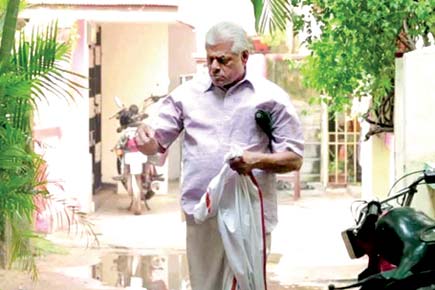I’ve just returned from the Bengaluru International Film Festival (BIFFES), where I was on the jury for Indian films

 I’ve just returned from the Bengaluru International Film Festival (BIFFES), where I was on the jury for Indian films. The festival now runs in Bengaluru and Mysuru, both cities I love. Bengaluru is a land of crisp morning air, the gorgeous Lalbagh Gardens, and elegant villas framed by frangipani trees in hi-fi enclaves like Palm Meadows. Their society revels in caste and hierarchy as anyone else: dinner invites came from the ‘Worshipful Mayor’; post-fest lunch was at a restaurant called “Brahmin Café” — eeks! — where you could nonetheless eat a satisfying “rice plate”, even in a swank mall. Full marks for whoever invented bisi bele huli anna, maddur vade, masala vada, “degree coffee”, badami haalu and Mysorepak dripping in ghee. Menu cards suggest culinary hamams — kesari bath, khara bath, chow chow bath — but of course, it’s just how they spell rice (bhat) locally. But, nothing can beat the priceless Horlicks barfi. Take that, you Dominoes-Shominoes!
I’ve just returned from the Bengaluru International Film Festival (BIFFES), where I was on the jury for Indian films. The festival now runs in Bengaluru and Mysuru, both cities I love. Bengaluru is a land of crisp morning air, the gorgeous Lalbagh Gardens, and elegant villas framed by frangipani trees in hi-fi enclaves like Palm Meadows. Their society revels in caste and hierarchy as anyone else: dinner invites came from the ‘Worshipful Mayor’; post-fest lunch was at a restaurant called “Brahmin Café” — eeks! — where you could nonetheless eat a satisfying “rice plate”, even in a swank mall. Full marks for whoever invented bisi bele huli anna, maddur vade, masala vada, “degree coffee”, badami haalu and Mysorepak dripping in ghee. Menu cards suggest culinary hamams — kesari bath, khara bath, chow chow bath — but of course, it’s just how they spell rice (bhat) locally. But, nothing can beat the priceless Horlicks barfi. Take that, you Dominoes-Shominoes!
 A still from Narai Ezhudhum Suyasaridham
A still from Narai Ezhudhum Suyasaridham
ADVERTISEMENT
It is always an honour and an education to watch movies on a jury, and what struck me this time, was how different the starting point of a movie can be. Most assume that a movie starts with a script, which then gets made into a film. But there can be many other starting points for films — which have little to do with a script — such as a poem, music, or just a place. For instance, take the delightful Tamil film Narai Ezhudhum Suyasaridham (Endless; literally Autobiography of a Grey Hair) by Manikandan K (not the Kakkaa Muttai guy; this one is ‘Mimicry Mani’). It is a charming film about the friendship between a retired man and an unemployed youth, that is begging to be remade. Initially, I had thought it was inspired by the big French hit Intouchables, about the bonding between a rich, paralysed aristocrat and his black, job-seeking caretaker, which was nominated for a Golden Globe and which Karan Johar and Guneet Monga are remaking in Hindi. But Manikandan said he had not seen Intouchables, and in fact, the starting point for Endless was a poem by 12th century Tamil woman poet Avvaiyar, titled Ariyadhu, Periyadhu, Iniyathu, Kodiyathu (Rarest, Biggest, Sweetest, Most Excruciating), in which she describes poverty in youth and loneliness in old age as being unbearable. Manikandan decided to combine the two ideas in the same film. The film (starring ‘Delhi Ganesh’, the director himself and ‘Mirchi Vijay’), also has superb music and singers, including the lovely ‘Secondu Leftu’ — directions the hero gets when going for a job interview — with lyrics by the director.
In the case of Raam Reddy’s Kannada film Thithi — an Indo-US co-production that won two prizes at Locarno, the Jury Grand Prize at the Mumbai Film Festival, and was opening film of BIFFES — the starting point of the film was a place. The film is about how three generations of a family respond to the death of the patriarch. The film is set in Nodekopplu village in Mandya district, Karnataka, where the co-writer Eregowda has lived, and was based on people he knew and his experiences; the cast are mostly local non-professionals. “The movie started off with the idea that this place had something special that we could adapt for cinema. The place kept building the story for us in a very organic way,” Reddy told the press, while Eregowda added, “We knew whom we would shoot and where, because we wrote for the place.”
In contrast, the film Gandu, directed by Q, has its origins in music. This black and white film which was at the Berlin Film Festival, is about the friendship between the son of a sex worker and a rickshaw driver. Q was jamming with the music band Five Little Indians. They came up with four or five songs they were pleased with, then Q thought, why not weave a film around this music. “So, the music was the starting point,” Q once told me. “It is entrenched in Bengali culture, but the language of the film is electronica, rap and cinema. They don’t know what to make of me in Kolkata, since it’s neither a Buddhadeb Dasgupta, nor an Anjan Dutt kind of film.” When Q came to Berlin with his team to present the film, they celebrated by doing a gig at the after-party in a hip bar in the lively Berlin suburb of Kreuzberg. I knew they had come a full circle.
Nupur Mahajan is a sum of many parts. Ideas are her business even as her creative streak sees her straddle television, advertising, publishing, radio and brands. Reach her at nupurmahajan@icloud.com
 Subscribe today by clicking the link and stay updated with the latest news!" Click here!
Subscribe today by clicking the link and stay updated with the latest news!" Click here!







